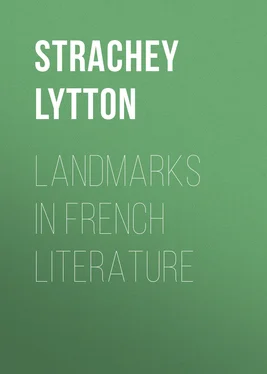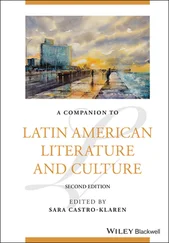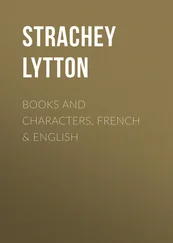Lytton Strachey - Landmarks in French Literature
Здесь есть возможность читать онлайн «Lytton Strachey - Landmarks in French Literature» — ознакомительный отрывок электронной книги совершенно бесплатно, а после прочтения отрывка купить полную версию. В некоторых случаях можно слушать аудио, скачать через торрент в формате fb2 и присутствует краткое содержание. Жанр: Языкознание, foreign_antique, foreign_prose, Зарубежные любовные романы, на английском языке. Описание произведения, (предисловие) а так же отзывы посетителей доступны на портале библиотеки ЛибКат.
- Название:Landmarks in French Literature
- Автор:
- Жанр:
- Год:неизвестен
- ISBN:нет данных
- Рейтинг книги:4 / 5. Голосов: 1
-
Избранное:Добавить в избранное
- Отзывы:
-
Ваша оценка:
- 80
- 1
- 2
- 3
- 4
- 5
Landmarks in French Literature: краткое содержание, описание и аннотация
Предлагаем к чтению аннотацию, описание, краткое содержание или предисловие (зависит от того, что написал сам автор книги «Landmarks in French Literature»). Если вы не нашли необходимую информацию о книге — напишите в комментариях, мы постараемся отыскать её.
Landmarks in French Literature — читать онлайн ознакомительный отрывок
Ниже представлен текст книги, разбитый по страницам. Система сохранения места последней прочитанной страницы, позволяет с удобством читать онлайн бесплатно книгу «Landmarks in French Literature», без необходимости каждый раз заново искать на чём Вы остановились. Поставьте закладку, и сможете в любой момент перейти на страницу, на которой закончили чтение.
Интервал:
Закладка:
He was above all things a rhetorician; he was an instinctive master of those qualities in words which go to produce effects of passionate vehemence, vigorous precision, and culminating force. His great tirades carry forward the reader, or the listener (for indeed the verse of Corneille loses half its value when it is unheard), on a full-flowing tide of language where the waves of the verse, following one another in a swift succession of ever-rising power, crash down at last with a roar. It is a strange kind of poetry: not that of imaginative vision, of plastic beauty, of subtle feeling; but that of intellectual excitement and spiritual strength. It is the poetry of Malherbe multiplied a thousandfold in vigour and in genius, and expressed in the form most appropriate to it—the dramatic Alexandrine verse. The stuff out of which it is woven, made up, not of the images of sense, but of the processes of thought, is, in fact, simply argument. One can understand how verse created from such material might be vigorous and impressive; it is difficult to imagine how it could also be passionate—until one has read Corneille. Then one realizes afresh the compelling power of genius. His tragic personages, standing forth without mystery, without 'atmosphere', without local colour, but simply in the clear white light of reason, rivet our attention, and seem at last to seize upon our very souls. Their sentences, balanced, weighty and voluble, reveal the terrors of destiny, the furies of love, the exasperations of pride, with an intensity of intellectual precision that burns and blazes. The deeper these strange beings sink into their anguish, the more remorseless their arguments become. They prove their horror in dreadful syllogisms; every inference plunges them farther into the abyss; and their intelligence flames upward to its highest point, when they are finally engulfed.
Such is the singular passion that fills Corneille's tragedies. The creatures that give utterance to it are hardly human beings: they are embodiments of will, force, intellect and pride. The situations in which they are placed are calculated to expose these qualities to the utmost; and all Corneille's masterpieces are concerned with the same subject—the combat between indomitable egoism and the forces of Fate. It is in the meeting of these 'fell incensed opposites' that the tragedy consists. In Le Cid , Chimene's passion for Rodrigue struggles in a death-grapple with the destiny that makes Rodrigue the slayer of her father. In Polyeucte it is the same passion struggling with the dictates of religion. In Les Horaces , patriotism, family love and personal passion are all pitted against Fate. In Cinna , the conflict passes within the mind of Auguste, between the promptings of a noble magnanimity and the desire for revenge. In all these plays the central characters display a superhuman courage and constancy and self-control. They are ideal figures, speaking with a force and an elevation unknown in actual experience; they never blench, they never waver, but move adamantine to their doom. They are for ever asserting the strength of their own individuality.
Je suis maître de moi comme de l'univers,
Je le suis, je veux l'être,
declares Auguste; and Médée, at the climax of her misfortunes, uses the same language—
'Dans un si grand revers que vous reste-t-il?'—'Moi!
Moi, dis-je, et c'est assez!'
The word 'moi' dominates these tragedies; and their heroes, bursting with this extraordinary egoism, assume even more towering proportions in their self-abnegation than in their pride. Then the thrilling clarion-notes of their defiances give way to the deep grand music of stern sublimity and stoic resignation. The gigantic spirit recoils upon itself, crushes itself, and reaches its last triumph.
Drama of this kind must, it is clear, lack many of the qualities which are usually associated with the dramatic art; there is no room in it for variety of character-drawing, for delicacy of feeling, or for the realistic presentation of the experiences of life. Corneille hardly attempted to produce such effects as these; and during his early years his great gifts of passion and rhetoric easily made up for the deficiency. As he grew older, however, his inspiration weakened; his command of his material left him; and he was no longer able to fill the figures of his creation with the old intellectual sublimity. His heroes and his heroines became mere mouthing puppets, pouring out an endless stream of elaborate, high-flown sentiments, wrapped up in a complicated jargon of argumentative verse. His later plays are miserable failures. Not only do they illustrate the inherent weaknesses of Corneille's dramatic method, but they are also full of the characteristic bad taste and affectations of the age. The vital spirit once withdrawn, out sprang the noisome creatures from their lurking-places to feast upon the corpse.
Nevertheless, with all his faults, Corneille dominated French literature for twenty years. His genius, transcendent, unfortunate, noble in endeavour, unequal in accomplishment, typifies the ambiguous movement of the time. For still the flood of 'Precious' literature poured from the press—dull, contorted epics, and stilted epigrams on my lady's eyebrow, and learned dissertations decked out in sparkling tinsel, and infinitely long romances, full of alembicated loves. Then suddenly one day a small pamphlet in the form of a letter appeared on the bookstalls of Paris; and with its appearance the long reign of confused ideals and misguided efforts came to an end for ever. The pamphlet was the first of Pascal's Lettres Provinciales —the work which ushered into being the great classical age—the Grand Siècle of Louis XIV.
In the Lettres Provinciales PASCAL created French prose—the French prose that we know to-day, the French prose which ranks by virtue of its vigour, elegance and precision as a unique thing in the literature of the world. Earlier prose-writers—Joinville, Froissart, Rabelais, Montaigne—had been in turns charming, or picturesque, or delicate, or overflowing with vitality; but none had struck upon the really characteristically French note. They lacked form, and those fine qualities of strength and clarity which form alone can give. Their sentences were indeterminate—long, complex, drifting, and connected together by conjunctions into a loose aggregate. The 'Precious' writers had dimly realized the importance of form, but they had not realized at all the importance of simplicity. This was Pascal's great discovery. His sentences are clear, straightforward, and distinct; and they are bound together into a succession of definitely articulated paragraphs, which are constructed, not on the system of mere haphazard aggregation, but according to the logical development of the thought. Thus Pascal's prose, like the verse of Malherbe and Corneille, is based upon reason; it is primarily intellectual. But, with Pascal, the intellect expresses itself even more exactly. The last vestiges of medieval ambiguities have been discarded; the style is perfectly modern. So wonderfully did Pascal master the resources of the great instrument which he had forged, that it is true to say that no reader who wishes to realize once for all the great qualities of French prose could do better than turn straight to the Lettres Provinciales . Here he will find the lightness and the strength, the exquisite polish and the delicious wit, the lambent irony and the ordered movement, which no other language spoken by man has ever quite been able to produce. The Lettres are a work of controversy; their actual subject-matter—the ethical system of the Jesuits of the time—is remote from modern interests; yet such is the brilliance of Pascal's art that every page of them is fascinating to-day. The vivacity of the opening letters is astonishing; the tone is the gay, easy tone of a man of the world; the attack is delivered in a rushing onslaught of raillery. Gradually, as the book proceeds, there are signs of a growing seriousness; we have a sense of graver issues, and round the small question of the Jesuits' morality we discern ranged all the vast forces of good and evil. At last the veil of wit and laughter is entirely removed, and Pascal bursts forth into the full fury of invective. The vials of wrath are opened; a terrific denunciation rolls out in a thundering cataract; and at the close of the book there is hardly a note in the whole gamut of language, from the airiest badinage to the darkest objurgation, which has not been touched.
Читать дальшеИнтервал:
Закладка:
Похожие книги на «Landmarks in French Literature»
Представляем Вашему вниманию похожие книги на «Landmarks in French Literature» списком для выбора. Мы отобрали схожую по названию и смыслу литературу в надежде предоставить читателям больше вариантов отыскать новые, интересные, ещё непрочитанные произведения.
Обсуждение, отзывы о книге «Landmarks in French Literature» и просто собственные мнения читателей. Оставьте ваши комментарии, напишите, что Вы думаете о произведении, его смысле или главных героях. Укажите что конкретно понравилось, а что нет, и почему Вы так считаете.












